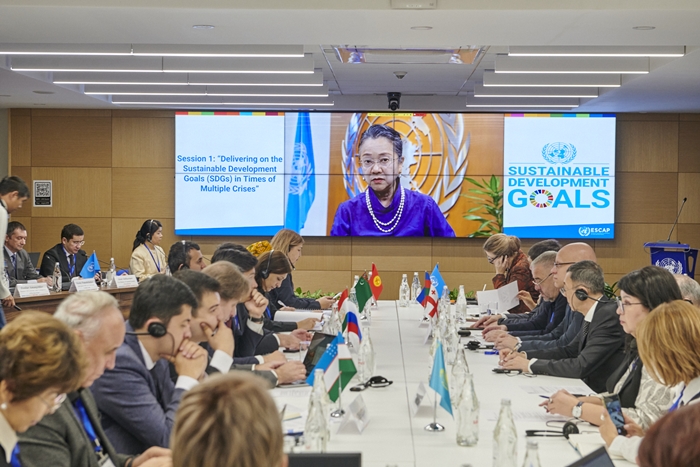The Seventh North and Central Asia Multistakeholder Forum on Implementation of the Sustainable Development Goals was on 1-2 November 2023 in Almaty, Kazakhstan. The forum was organized by the UNESCAP Subregional Office for North and Central Asia.
The high-level officials and representatives from various stakeholder groups reaffirmed their continued resolve and shared commitment to the 2030 Agenda for Sustainable Development and its 17 Sustainable Development Goals (SDGs), UNESCAP said in a press release.
Delegates further underscored the need to accelerate efforts to tackle the multiple crises faced in North and Central Asia. Recovery efforts from the COVID-19 pandemic continue to be hampered by global geopolitical conflict and its impact on inflation, food security and energy. In addition, the effects of tighter monetary policy in developed countries in response to higher inflation are posing significant challenges to many developing economies, raising the likelihood of financial distress and exposing pre-existing vulnerabilities.
“We need to accelerate actions for eradicating poverty in all forms and dimensions, and to continue expanding and improving employment opportunities, social protection, and provision of essential services,” said Armida Salsiah Alisjahbana, United Nations Under-Secretary-General and Executive Secretary of the Economic and Social Commission for Asia and the Pacific (ESCAP) opening the forum. She further underscored the need to align sectoral, local, national and international plans and policies with targets to accelerate decarbonization as well as advance climate justice and fairness.
North and Central Asia is currently not on track to achieve any of the 17 SDGs by 2030. While there has been positive progress on Goal 1 (No Poverty) and (Goal 16) Peace, Justice, and Strong Institutions (Goal 16) in the subregion, regressing trends have also been observed for several Goals related to Goal 13 (Climate Action).
“Global crises, including food and energy, COVID-19, climate change and geopolitical uncertainty, have seriously affected the socio-economic development of countries, and this has a significant impact on the implementation of the SDGs. It is encouraging that through common efforts we are gradually making up for lost economic growth rates. And the common goal is to jointly move forward in achieving the SDGs and consolidate the achieved results,” said Daniyar Amangeldiev, Minister of Economy and Commerce of the Kyrgyz Republic.
“It is critically important for us to intensify regional cooperation based on the principles of good neighbourliness, partnership and mutual benefit. Absolutely all participants – public, private, civil and international – have a role to play in ensuring that the necessary measures are taken to achieve sustainable development. Therefore, regional partnership between countries is an integral element of cooperation, including in the implementation of the sustainable development agenda,” said Abzal Abdikarimov, Vice-Minister of National Economy of Kazakhstan.
Gwi Yeop Son, Regional Director for Europe and Central Asia, United Nations Development Coordination Office shared, “Emphasizing the importance of holistic partnerships, we must ensure that our synergies foster innovative solutions, from addressing poverty and hunger to championing climate advocacy and promoting social equity. By channeling the strengths of every stakeholder, we aim to foster a region that is inclusive, resilient, and sustainable.”
The Forum bought together over 100 delegates from nine countries in North and Central Asia representing governments and the public sector, civil society, the private sector, academic institutions and international organizations. The shared their views and provided recommendations on how to accelerate the progress towards Goal 1 (No Poverty), Goal 2 (Zero Hunger), Goal 13 (Climate Action), Goal 16 (Peace, Justice and Strong Institutions), and Goal 17 (Partnership for the Goals).
The participants elaborated concrete recommendations on emerging challenges on food security in North and Central Asia, with focus on the ongoing energy-food-finance crisis, measures to accelerate in-country and regional actions for climate mitigation and adaption and promoting stakeholder engagement through participatory decision-making with focus on vulnerable groups.
The meeting is part of a series of five subregional forums which aim to inform, empower and support Asia-Pacific countries in their efforts to achieve the 17 SDGs and their targets by identifying subregional trends, as well as sharing best practices and lessons learned to take forward. Inputs from the subregional forums will also feed into the 11th Asia-Pacific Forum on Sustainable Development (APFSD) and global UN High-Level Political Forum (HLPF) in 2024. ///nCa, 6 November 2023
#ESCAP, #UN, #forum, #SDGs, #sustainable_development, #Central_Asia
